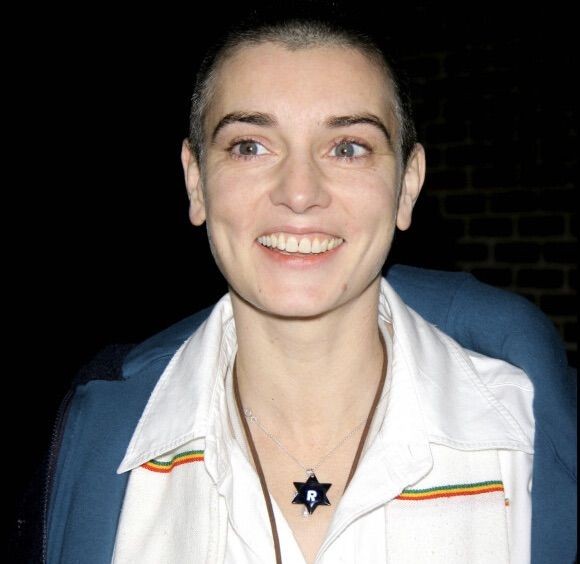Gordon Lightfoot Book, Music and More!
A conversation with Sinéad O'Connor
In July 2005, I spoke with Sinéad O'Connor about her reggae album, Throw Down Your Arms, that she’d recorded in Jamaica with Sly and Robbie. There was a lot going on in the world at the time. Live 8, the series of anti-poverty benefit concerts organized by Bob Geldof on the 20th anniversary of Live Aid, had just taken place. The news cycle was filled with horrific stories about the suicide attacks by Islamic terrorists that killed 56 early-morning commuters on the London Tube. We talked about those events, as well as ganga, God and her decision never to revisit her pop past again.
But Sinéad was musically motivated—Throw Down Your Arms was her first recording since her traditional Irish collection Sean-Nos Nua. And she was planning to tour the album. So mostly we focussed on her inspiration to record classic roots reggae songs, which she discussed in her typically candid way, with colourful asides about rap music, organized religion, Elton John and more. She also mentioned her 1992 appearance on TV’s Saturday Night Live when, following an acapella performance of Bob Marley’s “War,” she infamously tore up a photo of the Pope in protest against sexual abuses in the Roman Catholic Church. Here is our conversation:
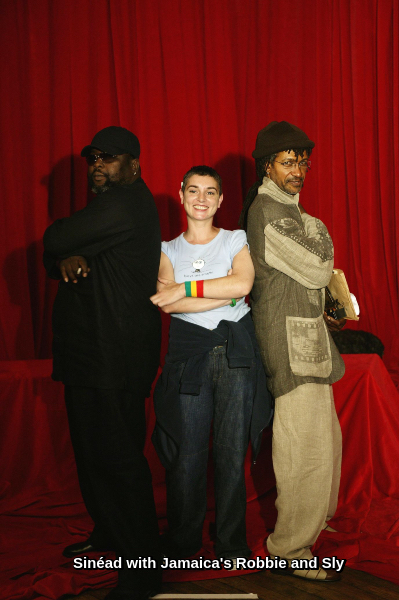 Q: A reggae album from you will be a surprise to most people?
Q: A reggae album from you will be a surprise to most people?
A: People who’ve been fans of mine for a long time would know that I’ve been a massive roots fan for years. I make a distinction between roots and reggae. I’m not really a reggae fan at all. But I love roots, which is the religious aspect of reggae music. They would also see the reflection of that within my own music over the years. It’s not actually a departure for me because it’s something that has had a huge influence on my personality as an artist. I consider myself to be a Rastafarian and have for years. Rast musicians) have had a huge influence on my personality, songwriting and my vision of what it means to be an artist in these times.
Q: You’ve performed with roots musicians?
A: Yes, Burning Spear last year. In the last few months with Bob Andy and Israel Vibrations. I’ve been to a lot of reggae shows. In the Rasta community they would know me, as far as the whole Pope business, for want of a better description, would have endeared me to numbers of Rasta people. Since those days, I’ve never played a show anywhere where two Rastas haven’t turned up at the dressing room and said ‘we want to speak with our sister’. There’s been a big bond. Obviously, the whole thing about the Bob Marley song on Saturday Night Live, which a lot of people don’t remember, was that I tied a Rastafarian prayer cloth to the microphone and the song was a prayer in many ways. Basically that was the point at which I publicly identified myself with Rastafarianism. I’ve had a very strong bond with those people since I was a child. I was born in December 1966 into what was at that time a Catholic theocracy. In Ireland, the experience of Catholicism has been very different to many other countries. I was born into a country that was a religious dictatorship. Very black and white place to be. One of the principle tenets of Catholicism in those days was that to be a good person you have to think that you’re shit. I was inspired as a small child by the civil rights movement and the struggle for self esteem, which existed in descendents of African slaves in America and the Third World. From the time I was three or four, I remember seeing kids being hosed off pavements in America when they tried to go to school, having had to fight for the ‘right’ to go to school. I saw the war that was going on in my own country and the war in Israel. It made me think, even as a child, that God and religion are two very separate things. To me, that’s what is attractive about the Rastafarian movement. As an Irish female Catholic survivor of child abuse, I identified enormously with the struggle for self esteem. One of the first characters who came into my life which led me into this was Muhammad Ali. As a child I used to watch him on TV and he was way ahead of his time, shouting about how beautiful he was. To us in Ireland, that was a sin. That’s why the kids loved him, because he was saying all the things we weren’t allowed to say. It was blasphemy for anyone to declare themselves lovely, let alone a black man. We began to understand from him and from the freedom movement in America, through Martin Luther King and others, that our struggle was similar to theirs. As a survivor of child abuse I had the same struggle with self esteem. As a Catholic woman I had the same struggle with the right to love myself. Or the right to declare myself valid. That’s where my identification with these people began. As a teenager, the black freedom movement, which I prefer to call the movement toward self esteem, I got into various singers like Curtis Mayfield. He was huge to me. I loved his “We People are Darker Than Blue.” That led me to other artists. When I was 17, I moved to London. That’s when I first came across Rasta people and Rasta music. My manager at the time was Faulkner O’Kelly, who was best friends with a guy who ran a radio station called the Dread Broadcasting Company. This guy ran a store on Portobello Road where he had an open mike session. These young Rastas used to come and sing off the top of their heads these incredible songs. I was quite a religious child. But I observed that God needs to be rescued from religion and that music was one of the ways of doing that. The church of music was quite boring. Once I came across the Rasta people and how they used music to teach scriptures, I found it hugely inspiring. Bringing God alive through music. Since I was a child, I thought that music was one’s channel of communication with God. The Rastas were the first I felt that were manifesting that. I learned most of my scriptures from Rasta records.
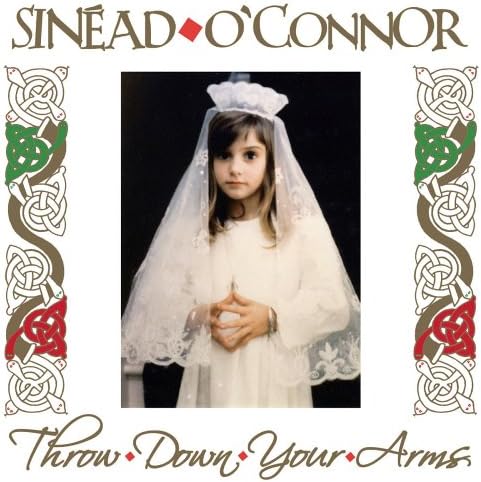 Q: Was Bob Marley an early influence?
Q: Was Bob Marley an early influence?
A: Not really, I didn’t get into Bob Marley until later. I bought “Could You Be Loved.” But I didn’t get mad into him until I was 22ish. Before that I was into people like Half Pint and the Heptones and Toots and the Maytals. Most people don’t know Bob Marley’s hardcore Rasta stuff. It’s the more commercial stuff. I only got into Bob Marley when I heard things like “Babylon System.” I’m strictly roots. I was into people who saw music as a priesthood. I didn’t realize that Bob did until I was older.
Q: How did you choose the songs for the album?
A: I chose songs that I’ve lived with for the last 20 years and that have saved my ass. They kept me afloat. “Jah Nuh Dead” by Burning Spear. He’s my favorite songwriter. He embodies a wonderful Jamaican trait. He doesn’t do small talk. They hardly talk at all. Only when absolutely necessary. Spear can impart an entire world of information in the space of five sentences. He’s a very gentle spirit but it’s a fantastic art to say a book’s worth of stuff in a couple of lines. I did four of his songs. “Marcus Garvey.” I was surprised to find that he was very like our own Patrick Pearce, an Irish civil rights fighter. “Y Mas Gan,” an Abyssinian tune, is my favorite track on the album. It embodies the whole reason for making the record, the idea that God should be praised continually and that music is the best way of doing that. There’s an old Latin saying that he who sings prays twice and the Rastas have had that knowledge for a long time. In these times, no one seems to write religious songs any more, hymns or anything like that, so we’re stuck with the same old boring crap. God must get pretty fed up listening to the boring crap. If I was God and I heard “Y Mas Gan,” I’d be like ‘thank me, that’s something new.’ It’s a cooler way of making a religious song. “Vampire” has always meant a lot to me. I like the mischief of it and the mischief of Rastafarianism. That’s a Lee Perry tune, as is “Curly Locks.” “Jah Nuh Dead,” “Marcus Garvey,” “Door Peep,” “He Prayed” and “Throw Down Your Arms” are all Burning Spear. “Prophet Has Arise” is by my favorite band on earth, Israel Vibration. it was very hard to choose one of their songs because I love them so bad. Their album Same Song is my favorite album of all time. That’s from that album. I had the great joy of singing with them recently at the London Astoria. that was fucking unbelievable. “Downpressor Man” is by Peter Tosh, another favorite songwriter of mine and very underrated in my opinion. These are songs that are normally sung by men. Traditionally, in the roots and reggae arena, women don’t sing warrior songs. They sing the love songs. It’s quite something for a small woman, let alone a small Irish woman, to try and sing these songs. Especially with Peter Tosh, it’s hard to take on the spirit of a nine foot tall man. I love the controlled anger of him. the hugeness of his spirit. “Untold Stories” is a Buju Banton song. Of the modern guys I loved Buju and Sizzla. They’re both very bad men and believe in terribly bad things. They’re very anti-gay. Jamaican culture is very anti-gay. Everyone complains and tries to stop them from playing in England. I don’t agree with their position. It makes me sad, but I don’t throw the baby out with the bathwater. These guys make great records. I don’t believe in everything they believe in. Unfortunately, the slacker the records are the fucking better produced they are. I’m anti-feminist in some ways, although I’m quite feminist really. An album like NWA’s Straight Outta Compton has my favorite track which is “I Ain’t the One,” which is a real anti-woman song but it’s the best fucking song on there. At the end of the day, you have to feel sorry for someone raised in Jamaican culture to believe those things. Sly and Robbie mixed the album themselves after I left. That was my first time in Jamaica and I went there on my own. I was completely accepted. I had a history with these people beforehand, as far as they were concerned, because of the Pope business. I wasn’t a total stranger. I didn’t feel any chauvinism. I thought it might be tricky because I’m a little woman. but it was amazing. It’s intimidating to go anywhere on your own as a woman. I didn’t buy into the rumors about how dangerous Kingston is. I just trust in God anyway. Once I got to the studio, it was happy family.
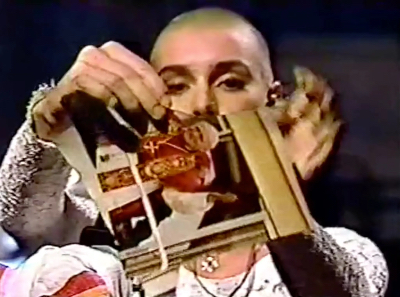 Q: So with this new album you’ve returned to work?
Q: So with this new album you’ve returned to work?
A: I wanted to get the muscle going. It seemed the logical follow on from Sean-Nos Nua. Once you’ve tackled those Irish songs as a singer, there’s nowhere else for you to go except into religious music. I came out of the mainstream arena and I wish to re-enter the arena of religious music. My feeling is that I was in the wrong arena all those years, which is why neither me nor they could understand.
Q: Can you reconcile the religious arena with commercial music?
A: Of course. I’m in an enviable position, which is that I have enough money that I don’t have to make records for any other reason than that I love them. That’s the only reason, I think, anyone should ever make a record. You shouldn’t unless you’re going to go crazy if you don’t. I’m 38, nearly 39, and hopefully I have another 39 years left and I can do what makes me happy and not what I’d do to make money. Obviously, I’m happy to make money though. With this album, I had to get my confidence back up. I hadn’t sung a note for three years. I was convinced that I’d forgotten how to sing. Once I started singing again I started writing songs. I hadn’t done that. I had put away all my instruments for three years. Hadn’t even looked at a guitar. Now I’m half way through the next album.
Q: How different will it be from this one?
A: Extremely different in so far as I’ve written all the songs and it will be all acoustic. It’s called Theology. Basically taking all the books from the scriptures and discussing those in songs. A very gentle record. Not hippie dippy corny religious, but quite religious.
Q: And you’ll be performing again?
A: We’re going on tour starting in November. I’m beside myself over it.
Q: What will you perform?
A: It will be just this album and a couple of other things. I came out of the mainstream and I’ve come back into the religious music arena. There are only two songs that I’m taking with me, therefore, from my former incarnation. “The Healing Room” (from Faith and Courage) and “Thank You for Hearing Me” (from Universal Mother). Everything else stays in the past and that’s a closed chapter. I don’t perform those songs ever.
Q: And never will?
A: No. I’ve come out of the pop mainstream arena and I don’t want to look back, even artistically. Those songs are about life experiences. I don’t want to go back there and that person doesn’t exist anymore, as far as I’m concerned, although I have a great fondness for that person. But that’s someone who needs to rest in peace. My approach is if I was a new artist starting off. That’s how I want to deal with it, as if I’ve started a new life and this is my first record.
Q: But your fans will want to hear your old songs?
A: We all need to just really make ourselves happy at the end of the day. I have to put myself first. Some people will go with me and some won’t and that’s cool. It’s very early days in my career and I hope to establish a long and strong career in the religious music arena. I’m trying to do a Mahalia Jackson. A particular transformation has taken place and once that has happened, you can’t step backwards. You have to be very sure of who and what you are. I don’t want to identify anymore with all of that. I’ve got to be me. Religious music isn’t the best term, it’s really religious/spiritual music. But it’s about making the distinction that God and religion are two very different things. I’m interested in rescuing God from religion through music. That is my own personal mission of choice.
Q: Who in the pop arena is making music like that?
A: Mainly in reggae, artists like Sizzla and Buju Banton. unfortunately, they’re also being found with caches of weapons in their front gardens. Van Morrison, although he’s not in the pop arena. There’s a guy called Michael Franti, who was with the band Spearhead. They’re pretty on course. There’s a couple of rappers around, DMX. some people end up being spiritual without meaning to be. I find 50 Cent quite a spiritual character, although I don’t know if he would. Certain records that Eminem has made, “Cleaning Out My Closet,” is a hugely spiritualized record, although again he may not realize it. There’s an Irish singer, Damien Dempsey, who is the best singer I’ve heard anywhere. He’s on a spiritual journey, I think. With some artists, it doesn’t manifest until they’re older. I think you’ll see more artists switch from the pop arena to the more spiritualized arena. The more successful you become in the pop arena, the more you realize how spiritually bereft it is. Fame and fortune and all that. Patti Smith is another. I don’t think in any of the boy band young girl band. Only when they win awards do they seem to think that God has something to do with this, when actually it’s just that someone wanted to make a TV show. Bruce Springsteen of course.
Q: What about Christian artists in pop music like U2 and others?
A: I don’t believe in taking on one set of beliefs because you’re shutting out all the others. I’ll be a whore when it comes to religious studies. I’ll be inspired by all of them. it’s slightly dangerous to be interested in only one way of looking at God. God doesn’t like religion. If you study the books of the prophets, which is the only place where God actually gets a voice, you see the God character in all of the Judaic scriptures and in most of them he’s very troubled by religion. One has to be very careful if you’re putting yourself forward as a spiritualized artist that you’re not affiliating yourself with one religion or another, because religion and God are very different things. I do believe in Jesus and all the power of Jesus. but that’s not all I believe in
Q: What’s your opinion of Live 8?
A: I think it’s incredible what everyone involved did and that includes all the people who went to it. However, I think we have to be very careful about getting into situations where we, if I can crudely put it, are sucking politicians’ cocks. We exist to be a voice in the wilderness, which we cease to be if we’re having dinner at the White House. I’d be a little wary of that aspect of it. But I think it’s amazing what Geldof has pulled off. The sense of power he’s given to people so that they feel they can do something. He’s not a cocksucker (laughs). He’s incredible. You can’t help but have immense pride in him as a person and what he’s done. Politicians really use artists. We’re hanging out with them so much we forget what we are. We need to keep the boundaries very clear. With Live 8, artists were told not to criticize the war in Iraq. That’s the danger. If we end up becoming friends with these people, how can we criticize them? Having said that, I didn’t get off my fat arse to do anything for Africa. There are seven deadly sins and one is vanity. And that’s a little bugger that will get you if you let it. When Elton John did that song for Diana, turning “Goodbye Norma Jean” into that awful song that perpetuated the myth of Diana as being this confused, crazy, weak woman. That was the establishment’s view of her and not the reality. The vanity on the part of the artist allows them to be manipulated by politicians for political purposes. We exist to challenge bullshit, so we mustn’t become part of bullshit
Q: How would you describe your life right now?
A: I’d characterize it as a rebirth. I’m approaching my work as a new artist and left the past in the past. Sinead O’Connor is now asleep and something else which is far more nurturing to my soul has come about.
Q: Is it difficult to get back to singing?
A: Terrifying. a lot of crying. I was absolutely petrified because there’s an awful lot to live up to. Everyone considers me such a great singer. But I know the horrible truth. Also, stepping into Kingston with a bunch of guys who’ve been playing around these records for years and years. That’s a little scary. A little woman trying to sing these big man songs. That’s a tough task. I cared about it very passionately.
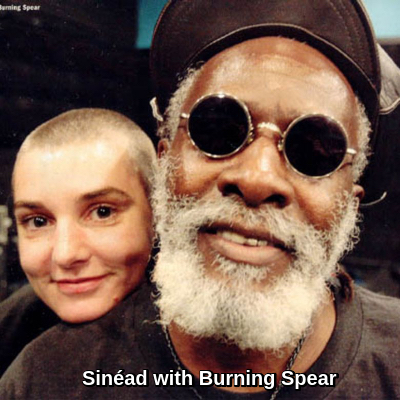 Q: Did you get an advice from Burning Spear or Israel Vibration?
Q: Did you get an advice from Burning Spear or Israel Vibration?
A: There’s a particular kind of handshake that men in Jamaica give each other and traditionally don’t give it to women. They grab your hand and you push your right shoulder into the other person’s right shoulder. Spear is the only Jamaican man who ever did that to me. That was in New York. He did that handshake with my son and then did it to me. I want to be one of the lads, essentially. That’s why I was thrilled Spear did that with me. When you do that handshake, it honors your warrior spirit. To me, part of making this album is honoring the spirit of man. these men are people who have been my guides a lot of my life. I changed the lyric of “Jah Nuh Dead” from “they tried to fool the black population” to “the whole population” on the grounds that if you got fooled then so did we. Spear wasn’t sure about my changing it. It was a little awkward when I told him. A lot of the old school guys want to make sure you’re respecting where they come from. Spear wanted to make sure I got the teachings. Once he understood that I wasn’t entirely brainless he was okay with it.
Q: What are your views on ganja?
A: I support the use of ganja by anybody who wishes to use it. I would use ganja whether I was a Rasta or not. I have been very happily a smoker of ganja since I was 20 and will always be
Q: Isn’t ganja a sacrament for Rastas?
A: I don’t know about that. I’m just a spliff head. I’ve never partaken it as a sacrament, I’ve just smoked a lot of joints with Rastas. I haven’t done any chalices. Do I condone the use of marijuana, yes I do. It’s not for everyone. I don’t drink alcohol. That’s not for me. I don’t do Class A drugs and I don’t condone the use of them at all, except under medical supervision. But when it comes to weed, I think you’re better off smoking a joint than having a drink.
Q: As someone who identifies as a Rasta, will you grow dreads?
A: No, it’s a state of mind being a Rasta. It’s not about how you look. You don’t have to be black or male or Jamaican or Ethiopian. It’s a state of consciousness. Rastafarianism is not a religion, it’s a movement. It’s about the idea of freeing God from religion. It’s a self esteem movement. It believes, as I do, that religion itself is idolatrous. If you believe that then you can call yourself a Rasta. It’s not about how you look but where you’re going and what you know. Whether you’re part of the team that frees God from religion. Rastafarianism is a school, a set of teachings, lessons, through which you learn that God and religion are two very separate things. I hope you don’t mind my going on about God. But we look around the world and dreadful things are happening.
Q: Like the appalling bombings that just happened in London?
A: Exactly, and people try to solve these things with politics but these are spiritual problems. I know it sounds corny, but there is a fucking God which does respond to the human voice. And no one is calling out, even people who think they believe in it, because they’re just talking to the wall which religion told them is God. This world could be fixed up very quickly if people really started discussing these things. So I hope what I’m saying doesn’t come across as just another “God is the answer” rant.
By accepting you will be accessing a service provided by a third-party external to https://www.nicholasjennings.com/


